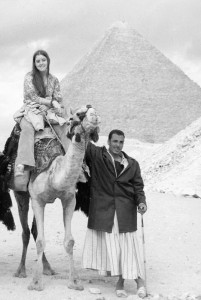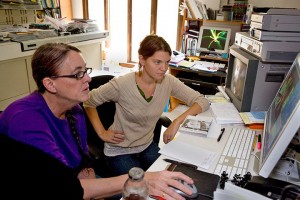Author Archives: Gail Mooney
We had friends over this past weekend, and we started talking about technology and the impact it’s had on our career, photography and life in general. I was talking about traveling and how much different it is now in regards to ease of communication and staying connected.
When I backpacked around the world, as a solo 19-year-old woman in the early 70’s, I pretty much left most communication with my family and friends behind. In a year’s time, I probably only called home 3 times and it was a lengthy and expensive process, going to a call center and waiting until an operator could put your call through to the other side of the world. And there wasn’t any Internet or email or cells phones and texting. When I left home for that yearlong sabbatical, I was really going out on a limb as far as disconnecting from the world I knew.
I’m always asked, “Were you scared?” I suppose I was afraid at times, when I thought about what I was doing and what could go wrong. But most of the time, I was too much in awe of what I was experiencing. I was very tuned in though, to my surroundings and I quickly developed a sixth sense about people, determining if they were good or bad. Those instincts stay with me to this day and have managed to keep me safe in my travels.
I could not have imagined what the future would bring to my life in terms of technology. The world we live in now is far different than it was some 40 years ago. We are more aware – of other cultures, world politics and global news. You would think that would help in bridging the gap of understanding between different cultures. I think it has in many ways, but we have a long way to go.
Our fears keep most of us from “daring” to do something different, especially if our life seems to be working. Usually, it takes a big change in our lives for us to muster up the courage to face the unknown. And when we do venture outside our norm, we are almost always glad we did and wonder why we had hesitated for so long.
I’ve been lucky. I had parents who encouraged me to take some risks. When I was hesitant about doing something, my dad used to say to me “What’s the worst thing that could happen?” and when I couldn’t come up with any really horrible potential scenario, I’d take the plunge and face my fears.
I wonder, what’s in store for me now? The future hasn’t been written yet and the choices are mine to make. Is it scary? Only if I imagine it that way. The story isn’t over yet.
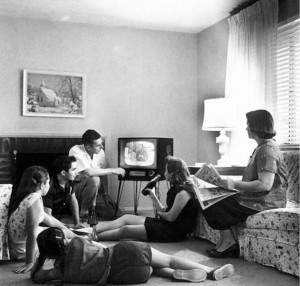 Sundays have always had a special feel to me. When I was a kid, Sundays were different. Most of the stores were closed so you couldn’t “go shopping”. I remember we had to plan ahead and get whatever we needed before Sunday came around. It was a day we went to church in the morning and always had dinner together – as a family. We often visited my Dad’s family, but other than that we didn’t do much of anything, but we did it as a family. Those were my earliest memories of what a Sunday was.
Sundays have always had a special feel to me. When I was a kid, Sundays were different. Most of the stores were closed so you couldn’t “go shopping”. I remember we had to plan ahead and get whatever we needed before Sunday came around. It was a day we went to church in the morning and always had dinner together – as a family. We often visited my Dad’s family, but other than that we didn’t do much of anything, but we did it as a family. Those were my earliest memories of what a Sunday was.
As the years went by, and my immediate family moved 700 miles away from our roots, our Sunday gatherings got a bit smaller, but nevertheless Sundays still had a special feel. It was considered to be a family day. We didn’t do too much on Sundays, rarely planning anything organized, but we did “nothing” together – as a family. Sunday was the day that we all took time to breathe.
As my siblings and I got older and started our own families, the gatherings got larger again. But life also became more hectic and we all tried to manage and coordinate our busy lives. The times had changed, and with that came lots of organized activities and other distractions. But somehow we managed to find time on some Sundays to get together as a family.
Nowadays, family gatherings are more infrequent as miles have separated us. But Sundays still have a special feeling. It’s still a day when I don’t set my alarm and I get my day started a little later. And I take the time to breathe.
I think what’s important, is that we remind ourselves to set aside time to enjoy and be grateful for what and who we have in our lives, regardless of which day of the week it is. When I was growing up, Sundays were always set aside for that. I suppose that’s why I have always loved Sundays.
A fellow “baby boomer” commented to me recently, “I guess we’ve all abandoned our dreams by now.” I immediately reacted by saying, “Speak for yourself.” I for one can’t imagine abandoning my dreams. Am I odd in that regard? Am I naïve? Am I different from my generation in that I’m still an optimistic dreamer? Or was the fellow who made the remark the odd one?
I’m not quite sure if my hopeful outlook  has to do with who I am, or is a trait of my culture as an American or I’m the product of the generation I grew up in? I suppose my hope stems from all of the above. I read an article in the May 20th edition of Time Magazine, entitled the ME ME ME generation – the Millennials. Part of the article talked about basic broad stroke traits of other generations. Generally I don’t like broad stroke summations of a culture or a generation but nevertheless I found some of the descriptions to be pretty much on target.
has to do with who I am, or is a trait of my culture as an American or I’m the product of the generation I grew up in? I suppose my hope stems from all of the above. I read an article in the May 20th edition of Time Magazine, entitled the ME ME ME generation – the Millennials. Part of the article talked about basic broad stroke traits of other generations. Generally I don’t like broad stroke summations of a culture or a generation but nevertheless I found some of the descriptions to be pretty much on target.
As far as being “hopeful” the Millennials are more in kin to the Baby Boomers, and tend to believe in themselves and the power of realizing their dreams. They seem to be more interested in what they can do and on a global scale than Generation X, which came before them. Sadly, Generation X came up at time when “greed was good”, “heroin chic” was a style in vogue and ennui ruled the day. Those are pretty broad strokes for sure, but I think the over riding thread that seems to define a generation is whether they tend to be hopeful or not.
I find that I always need to be creating something. It’s what gets me up in the morning. It’s what gives me hope. It’s also what every single person possessed who took part in our film project. They all believed that they were doing whatever was in their power to do and that gave them hope. Of course the key is in the doing and that is why I love to create.
Think about it. You can either give yourself reasons NOT to do something or you can give yourself reasons TO do something. Giving yourself reasons not to do something may seem like it empowers you but it actually leaves you powerless. It puts your destiny in everyone else’s hands. That rarely yields hope. The act of doing something, on the other hand, creates possibility.
The universe holds possibility for anything and everything to happen – we just need to put things into motion to allow them to happen. Nine out of ten things might not work out but that doesn’t mean they didn’t play a part in the process. It doesn’t mean they didn’t have value. Perhaps the value will be realized later on.
“If you want a happy ending, it depends on where you stop the story.”
Orson Welles
In some ways we have never been more connected than we are right now – at this juncture in the timeline of mankind. In other ways we have never been more disconnected and detached. When I embarked on a 99 journey around the world almost 3 years ago to date, I suppose in some ways I was looking to get more connected with what was happening globally, in a real sense. These days, it’s too easy to fall into a cyber world, where most of our connections are intangible. Call me old fashioned, but I feel the need to connect with people in real terms. When I returned from my journey, I had not only connected with people from all around the world, I had connected with myself and what part I was meant to play in the timeline of life.
As the years have ticked away, I have tried to remain true to myself, especially in how I apply that to my craft and my career. This past weekend I had an assignment for Kiwanis Magazine. The assignment was to photograph volunteers from the local 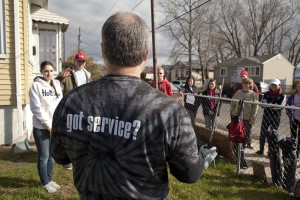 Kiwanis and Ki Clubs, repairing a home at the NJ shore that had been damaged by Hurricane Sandy. I had not been down to the shore since Sandy, but I knew this area had been the hardest hit in the state. While much of the debris has been taken away, there’s an empty and desolate presence especially in the poorer towns that had no money to rebuild.
Kiwanis and Ki Clubs, repairing a home at the NJ shore that had been damaged by Hurricane Sandy. I had not been down to the shore since Sandy, but I knew this area had been the hardest hit in the state. While much of the debris has been taken away, there’s an empty and desolate presence especially in the poorer towns that had no money to rebuild.
The task on hand for the volunteers that day, and there had to be about 30 people who showed up, was to install new sheet rock and insulation, put in a new bathroom and do general clean up of the property. It was a modest home in a very modest neighborhood of houses that had been salvaged amongst the ones abandoned. The first thing that hit me was in fact – this is someone’s home. 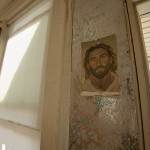 As much as I was there to photograph the volunteers, my eye was drawn to the personal effects of the owners, pushed up into the corners of damaged rooms along with their Easter decorations in rooms they were living in. Life must go on.
As much as I was there to photograph the volunteers, my eye was drawn to the personal effects of the owners, pushed up into the corners of damaged rooms along with their Easter decorations in rooms they were living in. Life must go on.
The day was filled with positive energy. Kids were painting, raking, cleaning storm drains while older tradesmen were working with other volunteers and teaching them their craft. And at the end of the day, everyone walked away tired, but feeling really good about the contribution they had made. I’m sure some of these kids had to do some kind of community service as part of their school mandates, but could I tell that every one of them got a lot more out of the experience than just school credits. I know I got a lot more out of it than a paycheck and some photographs in a magazine.
After the chores had been done and I had gotten the photographs that I needed, I took a drive with my husband along the ocean road. It was a new landscape, changed by a hurricane that hit hard. But I felt hopeful and humbled once again about the power that’s in all of us to make a difference.
I’ve been to dozens of screenings over the past year, at film festivals, schools and community gatherings around the country and everyone always asks the same thing: “What can I do? How can I get involved?” 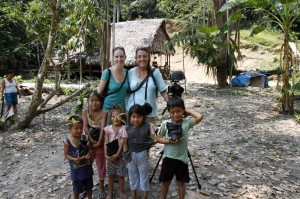 And that’s exactly what Erin and I hoped for when we created the film, that people would be inspired and moved to take action.
And that’s exactly what Erin and I hoped for when we created the film, that people would be inspired and moved to take action.
So, we have changed the Opening Our Eyes website so that we can help answer that question instead of being a dead end. I wanted the film to be a jumping off point for people to take action, but that would only happen if we could direct that energy into tangible ways.
We’ve set up a “take action” page, with three different sections on ways that you can help make a positive difference in your community or on a more global scale. You can “become the power of one” and find out how Maggie Doyne used her babysitting earnings to make a difference or find explore volunteer travel opportunities. You can “multiply the power of one” and donate to our subjects’ causes or find out about volunteering for them or you can host a screening of the film and “showcase the power of one.”
Every time I start to step away from this project, something happens to pull me back into it. So I suppose that this journey isn’t over. I continue to be amazed by the collective power we all have in making change happen and making our world the world we want to live in. I still remember what one of our subjects, Robbin Moulds told us one rainy day in Sydney, Australia. She said, “At 211 degrees water is hot. At 212 degrees it boils. That’s a one degree difference.”
I challenge you all – what’s a one degree difference you can make?
I’ve been to quite a few screenings over the past year of our feature documentary, Opening Our Eyes and it has been an interesting experience. What I love the most are the questions and comments that come up in the Q&A after the screening. The most asked question is “How did you pick your subjects for the film?”
I could write an entire bog about how we picked our subjects (and may have already), but the simple answer is that I sent out an email to everyone I knew asking them if they knew or knew of people – individuals – on all 6 continents – who were making a positive difference in the world. The response was overwhelming and I still have folders of subject ideas that I would love to do short stories about if I can find the funding and the time.
My daughter and I waited until we got back from our round-the-world trip to decide on our North American subject(s) and ended up shooting that segment 4 months later. Surely we were in a different frame of mind and it shows in the piece – it’s a big edgier and less optimistic, but then again it is a story about two women, Maureen Taylor and Marian Kramer, 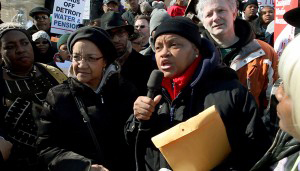 working against all odds in the inner city ravages of Detroit. They are volunteers and street activists – the “voice” for the poor and disadvantaged of their community.
working against all odds in the inner city ravages of Detroit. They are volunteers and street activists – the “voice” for the poor and disadvantaged of their community.
Many times when I’ve screened the film, folks want to know why I chose that story to be in the film and some tell me I should take it out – but I won’t. We have edited this segment when we cut the film from 76 minutes to 61 minutes. In the process, we “toned it down”, but I didn’t do that to appease the crowd, I did it because our subjects were good and caring women who were passionate about their cause and I wanted the audience to like them. I also wanted the audience to listen to what they were saying, rather than get defensive and tune them out.
Ultimately the Detroit segment has what every good story needs – conflict. But it also has hope for a better future. This segment is different from the other stories in the film, in that it’s not about giving children and teens a home, or rescuing food or saving the environment, but it is about something that is equally important and that is giving the people a “voice”. Without that, there is no hope for hundreds of thousands of disadvantaged people in America.
Being able to have our voice heard is perhaps the most important privilege we have as citizens of this country or any country for that matter. If our “voice” gets silenced, or restricted, the rest of our freedoms will be in danger. Maureen and Marian understand the importance of using their voice. I do as well, and that’s why that story “stays in the film”.
The best part about creating the documentary, Opening Our Eyes, was getting to be around some of the most amazing, inspirational people I’ve ever met in my life. So many things that these folks said during their interviews, still run through my mind on a daily basis.
One thing in particular was something that Maggie Doyne said when she was talking about what she built in Nepal “It’s not perfect. If I had waited for things to be perfect, none of this would have happened.”
I work and live with a perfectionist, my husband and my business partner. We are opposites in every way. I am one to take my “big idea” and jump right into it. I’m also one who wants to complete something and follow through right away, regardless if it’s “perfect” or not. For example: I could have/should have gotten this film professionally color graded before I sent it out to festivals and distributors. But, I didn’t have the funds to do that, so rather than let the film “get old” until I could get more funding (which may not have happened), I pushed it out to the universe, and good things have happened.
It’s good to be detail oriented and to strive for perfection, but not if you use it to give yourself reasons to stop yourself from moving forward. Many times, when I tell my husband my latest “big idea”, his first instincts are to tell me dozens of reasons I shouldn’t act on it until……………everything is perfect. His intentions are good – he wants to protect me from failure, but if I let it, his words might also end up protecting me from success.
We both recognize our differences now as our individual strengths and that when we listen, learn and balance those opinions and differences so that they can work together instead of opposed to each other, great things can happen. But that takes practice and also not having to be right all the time. There is no one “right” and that’s the beauty of collaboration and working in harmony.
“She’s from the mainland isn’t she?” the woman said as she got into my friend’s truck. I laughed and she said “I knew you weren’t from here when you said, “hi, I’m Gail and extended your hand” – “ we don’t do that here.” My good friend PF Bentley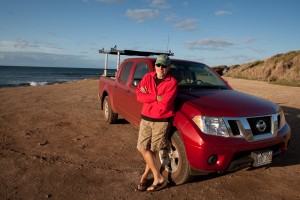 was driving me to the tiny island airport and he had stopped to pick up a couple of friends for a meeting they were going to attend after getting me on my way.
was driving me to the tiny island airport and he had stopped to pick up a couple of friends for a meeting they were going to attend after getting me on my way.
Last week, after getting an email from PF alerting me about incredible airfares to Hawaii ($425 roundtrip from Newark to Honolulu), I made an impulse decision, bought a ticket and here I was on the island of Molokai,  heading home after 4 days on the island. Some might say, that’s an awful long way to go for such a short time and I suppose that may be true. However it was 4 days that gave me a well needed break, and more importantly a time to step back from the noise of my life and ask myself “have I gotten off purpose?”
heading home after 4 days on the island. Some might say, that’s an awful long way to go for such a short time and I suppose that may be true. However it was 4 days that gave me a well needed break, and more importantly a time to step back from the noise of my life and ask myself “have I gotten off purpose?”
The fact is I had gotten way off purpose over the last few months. I had begun doing things other people wanted me to do and in the process I forgot who I was. When that happens, everything seems to turn sour and in the process I seem to do more “pushing” my dreams out there, and getting nowhere. Instead I should do what it is I am meant to do, regardless if people accept it or understand it and then things will fall into place as they should.
Over a decade ago, PF had taught me how to tell a story and how to translate that to “film”. If it weren’t for PF, our film, Opening Our Eyes would not have been possible. Thirteen years ago, he stirred something inside of me and I went from a state of stale complacency to an awakened spirit. 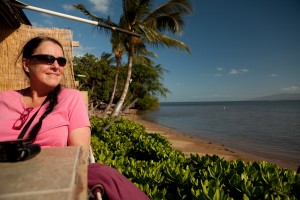 The spirit had always been inside of me, but I had begun not to listen to it.
The spirit had always been inside of me, but I had begun not to listen to it.
It’s been a short but glorious 4 days. PF and his beautiful wife Amy soothed my soul with humor, color, art, wonderful food  and love. Amy is one of the most creative people I have ever met and a true inspiration in many ways. She taught me the ukulele and we played and sang and laughed. PF taught me new technical skills – color grading and mixing sound, but he also showed me his island home and once again he awakened my spirit. Mahalo (thank you) Amy for bringing color to my life and thank you PF for once again getting my train back on track.
and love. Amy is one of the most creative people I have ever met and a true inspiration in many ways. She taught me the ukulele and we played and sang and laughed. PF taught me new technical skills – color grading and mixing sound, but he also showed me his island home and once again he awakened my spirit. Mahalo (thank you) Amy for bringing color to my life and thank you PF for once again getting my train back on track.
I think sometimes we kid ourselves when we don’t recognize that certain things we do or say are mild forms of discrimination. There’s the occasional “soccer mom” comment that’s not intended to marginalize women or the references about “those people”. Many times the worst offenders are the ones who aren’t even aware they do discriminate.
I’ve spent my life and career as a woman in a man’s business. I’ve heard all the remarks that I care to hear and the bias that comes with it. Things have certainly improved over the last 35 years but now I’m facing a different sort of discrimination and that is the prevalent disregard for someone who is “old”.
When people equate youth, (defined by age) 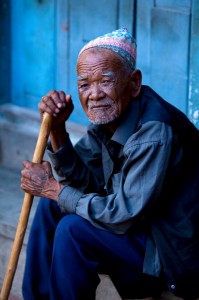 as someone who has new or fresh ideas and old as someone who is set in their ways and stagnant, that is a form of discrimination. In America we have become obsessed with youth and looks to the point that we don’t value anyone over 40. We not only don’t think this generation of aging baby boomers is relevant or has value, but we seem to be angry that they should have a right to things like social security or pensions or even a job. We want them just to go away and become invisible. We are a culture that places importance on the “packaging and the fizz”.
as someone who has new or fresh ideas and old as someone who is set in their ways and stagnant, that is a form of discrimination. In America we have become obsessed with youth and looks to the point that we don’t value anyone over 40. We not only don’t think this generation of aging baby boomers is relevant or has value, but we seem to be angry that they should have a right to things like social security or pensions or even a job. We want them just to go away and become invisible. We are a culture that places importance on the “packaging and the fizz”.
The fact of the matter is that age really has nothing to do with wisdom at all. Just because you get older doesn’t mean you necessarily get wiser. And just because you’re younger doesn’t mean you’re someone with forward thinking ideas. I’ve met a lot of older people who aren’t wise at all and I’ve met people half my age that couldn’t come up with a fresh thought if their life depended on it.
Age isn’t a barometer for how you process ideas. Look at people like Clint Eastwood – he did his best and most creative work after he turned 65. (I’ll forgive him for the chair incident.) I’d like to think that one of the best things that came out of this project that I did with my daughter was that we both had a much better understanding of who were as people. I wasn’t just her “old” mom who didn’t know anything and she wasn’t just my “kid” who didn’t know anything.
So next time you find yourself equating age with how someone thinks – step back and recognize that subtle discrimination and ask yourself if you would like to be on the receiving end of that?
We honor Dr. Martin Luther King Jr. today. Much has been written about King, but most of my impressions of this great man were made when I was a young teenager. I remember many of his great speeches and his marches, but what I remember most is thinking – how could one man be so full of love amongst all the hate in the world.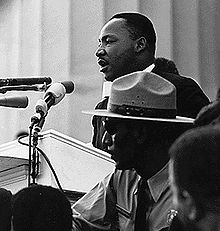 It was a tumultuous time in America, a time when the country was deeply divided by race and the Vietnam War and yet King was so full of love.
It was a tumultuous time in America, a time when the country was deeply divided by race and the Vietnam War and yet King was so full of love.
Dr. King was a gifted orator and I could fill endless pages with quotes, but I’ll site a couple that stand out to me:
“I have decided to stick to love…Hate is too great a burden to bear.”
And
“Forgiveness is not an occasional act, it is a constant attitude.”
These both go hand in hand because if we can’t forgive, whether it be the people who have hurt us or ourselves for the hurt that we’ve inflicted upon others, we will continue to harbor hate inside. I agree with King that it’s far better to stick to love because hate is too great a burden to bear.
It’s hard to forgive. To be able to forgive, one must come to terms with what or who has caused your heart to fill with hate or resentment. Sometimes in our attempts to bury our pain, we try to dismiss or deny that it’s there. But that doesn’t free our souls from the negative energy that hatred breeds – it only buries it deep inside us and consumes our spirit.
To “stick with love” is to recognize that humans are not perfect and when someone portrays their “ugly” side, which is generated by ego and fear that ultimately it’s better to see past the ugliness and notice the good. The funny thing about love is that when one person starts by treating another person with love instead of contempt, it gets paid forward and the love spreads.
“Hatred paralyzes life; love releases it. Hatred confuses life; love harmonizes it. Hatred darkens life; love illuminates it.”
Dr. Martin Luther King Jr.
